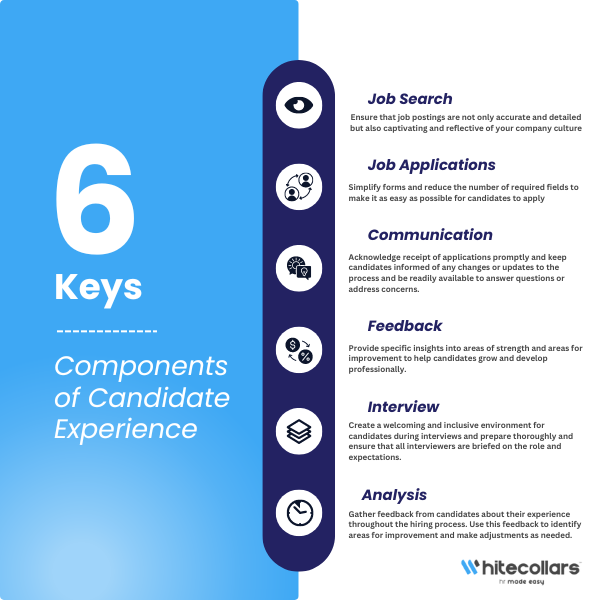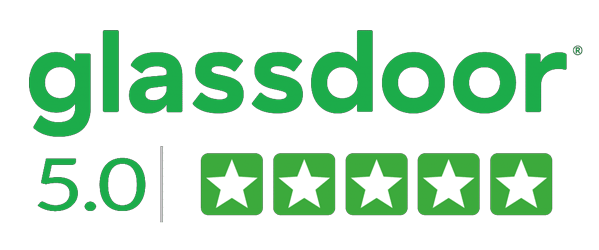
In the ever-competitive talent market, attracting and retaining top performers requires a strategic approach. While competitive compensation and strong benefits packages remain important, companies are increasingly recognizing the significance of candidate experience (CX) throughout the recruitment process.
Studies found that companies that prioritize candidate experience see a 33% improvement in the quality of their hires. While Researh suggests that a strong candidate experience can lead to a 43% reduction in the time it takes to fill open positions.
This blog delves into the importance of crafting a positive CX, exploring its impact on talent acquisition and employer branding. We’ll equip you with actionable strategies to elevate your candidate journey, ultimately fostering a more engaged talent pool and securing the best fit for your organization’s needs.
Candidate Experience Definition
We’ve all heard the saying, “You never get a second chance to make a first impression.” But in today’s competitive talent market, recruiters and hiring managers need to think beyond that initial handshake. The key to attracting and retaining top talent lies in crafting a stellar Candidate Experience (CX).
Think of it like this: Imagine your ideal candidate as a tourist exploring your company. The CX is their entire journey – from stumbling upon your company’s “tourist brochure” (job description) to navigating the application process (customs), experiencing the interview “sights” (company culture), and receiving their final “souvenir” (offer letter or rejection notification). Every interaction, every touchpoint, shapes their perception of your company.
Understanding the Candidate Journey
Recruiters, imagine this: You’ve crafted the perfect job description, a beacon of opportunity for your ideal candidate. But where do they go from there? The answer lies in the Candidate Journey, the often-overlooked roadmap that shapes their experience with your company.
Think of it this way: the candidate journey is a maze, and your goal is to guide them efficiently to the exit (the offer letter!). Here are the key stages you, as a recruiter, need to understand:
- Awareness: This is where candidates first encounter your company, whether through job boards, social media, or employee referrals.
- Consideration: Intrigued candidates delve deeper, researching your company culture, employee reviews, and the specific role.
- Interest: Now they’re hooked! They submit their application, showcasing their skills and experience.
- Application: The maze begins! Here’s where a smooth and user-friendly application process is crucial.
- Selection: Interviews, assessments, and reference checks – this is where you evaluate their fit for the role.
- Hiring: Congratulations! You’ve found your superstar. Make the offer letter clear, exciting, and personalized.
- Onboarding: Don’t let the good vibes stop here! A well-structured onboarding process sets them up for success.
Why is Candidate Experience Important?
let’s face it: the tables have turned. In today’s talent market, it’s not just about finding the perfect candidate – it’s about convincing them to choose you. Here’s where Candidate Experience (CX) becomes your secret weapon.
Think of it like this: a positive CX is a well-oiled machine, driving a multitude of benefits for your organization:
Attract Top Talent:
A positive CX is your company’s magnet. Happy candidates become brand ambassadors, sharing their experiences and attracting others like moths to a flame. This widens your talent pool and allows you to identify the best fit.
Increased Application Rates:
Nobody wants to apply for a black box. A transparent and engaging recruitment process, with clear communication and timelines, encourages more qualified candidates to apply.
Higher Offer Acceptance Rates:
You’ve found your ideal candidate, but will they say yes? A positive CX throughout the process builds trust and sets your company apart. Top talent is more likely to accept an offer if they’ve had a good experience.
Enhanced Employer Branding:
A seamless and respectful recruitment process paints a positive picture of your company culture. It shows you value people, not just resumes. This translates into a stronger employer brand, making you more attractive to future talent pools.
Reduced Time-to-Fill:
A streamlined CX with clear communication and efficient scheduling reduces delays and allows you to fill open positions faster. This minimizes the disruption caused by vacant roles and keeps your team functioning optimally.
Cost Savings:
Let’s face it, recruitment can be expensive. A positive CX reduces the need for re-recruiting due to high rejection rates or a negative candidate experience. This translates to cost savings in the long run.
Employee Referrals:
Happy candidates become advocates. A positive CX encourages them to refer their talented network, giving you access to a pre-vetted pool of potential hires.
Customer Perception:
Word travels fast. A negative candidate experience can damage your reputation and deter customers who value companies that treat people well. A positive CX reinforces a positive brand image that resonates with both candidates and customers.
Higher Employee Engagement:
Candidates who feel valued throughout the process, even if not selected, are more likely to view your company favorably. This translates into higher employee engagement once they’re on board. Engaged employees are more productive, satisfied, and less likely to leave.
The Bottom Line:
Investing in a positive candidate experience isn’t a nicety – it’s a strategic investment in your company’s future. By creating a seamless and respectful recruitment process, you’ll attract top talent, build a strong employer brand, and ultimately fuel your company’s success.
6 Key Components of Candidate Experience
As recruiters, you hold the key to shaping the candidate experience, ensuring that each interaction leaves a positive and lasting impression. Let’s explore how you can utilize the six key components to craft the best possible experience for your candidates:

1. Job Search:
Your role begins even before candidates apply. Ensure that job postings are not only accurate and detailed but also captivating and reflective of your company culture. Use language that speaks to your ideal candidate and clearly outlines what sets your organization apart. Make job listings easily accessible across various platforms and channels to reach a diverse pool of talent.
2. Job Application:
Streamline the application process to remove any unnecessary barriers or complexities. Simplify forms and reduce the number of required fields to make it as easy as possible for candidates to apply. Consider implementing technology solutions that allow for resume parsing and auto-population of fields to save candidates time and effort. Provide clear instructions and guidance throughout the application process to minimize confusion and frustration.
3. Communication:
Maintain open and transparent communication with candidates at every stage of the hiring process. Acknowledge receipt of applications promptly and provide realistic timelines for the next steps. Keep candidates informed of any changes or updates to the process and be readily available to answer questions or address concerns. Personalize your communication whenever possible to show candidates that they are valued and respected.
4. Feedback:
Offer constructive and personalized feedback to candidates, even if they are not selected for the role. Provide specific insights into areas of strength and areas for improvement to help candidates grow and develop professionally. Approach feedback as an opportunity to build relationships and foster goodwill, rather than as a mere formality.
5. Interview:
Create a welcoming and inclusive environment for candidates during interviews. Prepare thoroughly and ensure that all interviewers are briefed on the role and expectations. Ask insightful questions that allow candidates to showcase their skills and experiences. Actively listen to their responses and provide opportunities for them to ask questions and learn more about the organization. Offer a realistic preview of the role and company culture to help candidates make informed decisions.
6. Analysis:
Gather feedback from candidates about their experience throughout the hiring process. Use this feedback to identify areas for improvement and make adjustments as needed. Track key metrics such as time to hire, offer acceptance rates, and candidate satisfaction scores to measure the effectiveness of your recruitment efforts. Continuously iterate and refine your processes to ensure that candidates have the best possible experience.
What is Considered a “Good” Candidate Experience?
A good candidate experience means clear communication, respect, transparency, and efficiency. It’s all about how a person applying for a job feels throughout the hiring process, from the moment they see the job description to the final decision. It should leave them with a positive impression of your company, even if they don’t get the job.
Here are some key aspects of a good candidate experience:
- Clear communication: Candidates should know what to expect at every stage of the process, from application deadlines to interview formats. They should also be kept updated on the status of their application, even if it’s just to let them know they haven’t been selected for an interview yet.
- Respectful treatment: Treat all candidates with courtesy and professionalism, regardless of their experience level or qualifications. This includes things like giving them your full attention during interviews and thanking them for their time.
- Transparency: Be honest about the job requirements, the company culture, and the compensation and benefits package. Don’t mislead candidates about the role or the company.
- Efficiency: The application process should be smooth and easy to navigate. Avoid long-winded applications or unnecessary steps.
By following these tips, you can create a positive candidate experience that will help you attract and retain top talent.
How to Improve Candidate Experience?
Here are some ways to improve the candidate experience throughout the recruitment process:
1. Applicant Tracking Systems (ATS):
Applicant Tracking Systems (ATS) serves as the backbone of the recruitment process. Ensure you choose an ATS that offers an intuitive interface and user-friendly features. Train recruiters and hiring managers on how to use the ATS effectively to maintain consistency and transparency throughout the process. Customize automated messages and notifications to keep candidates informed about the status of their application, ensuring a smooth and engaging experience from start to finish.
2. Potential Sources:
Identify potential sources for attracting candidates, such as job boards, social media platforms, and professional networks. Tailor your recruitment strategy to each source, highlighting your employer brand and unique value proposition. Encourage employee referrals through incentivized referral programs and promote internal networking opportunities. Track and analyze the effectiveness of each source to optimize your recruitment efforts and reach a diverse pool of qualified candidates.
3. Pre-candidate Experience:
The pre-candidate experience sets the stage for a positive recruitment journey. Enhance your career portal with engaging content, including employee testimonials, company culture videos, and detailed job descriptions. Offer virtual tours, webinars, or informational sessions to provide potential candidates with insights into your organization. Ensure that your career portal is optimized for search engines and mobile devices to maximize visibility and accessibility, creating a welcoming and informative experience for candidates.
4. Candidate Drop-off:
Candidate drop-off can occur at various stages of the recruitment process and is often a result of friction or frustration. Conduct a comprehensive audit of your recruitment process to identify potential pain points and areas of improvement. Streamline application forms, reduce the number of required fields, and simplify the overall process to minimize drop-off rates. Implement automated reminders and follow-ups to re-engage candidates who have dropped off, ensuring that no qualified candidate slips through the cracks.
5. Days-to-Acceptance:
Days-to-acceptance is a critical metric that measures the efficiency of your recruitment process. Map out your recruitment process from initial contact to offer acceptance and identify opportunities to streamline and expedite decision-making. Set clear expectations with candidates regarding timelines and next steps to avoid delays in the process. Provide regular updates and feedback to candidates throughout the process to keep them engaged and informed, reducing time-to-fill and improving overall candidate satisfaction.
6. Career Portal Visitor Stats:
Analyzing career portal visitor stats provides valuable insights into candidate behavior and preferences. Use website analytics tools to track key metrics such as page views, bounce rates, and time spent on site. Identify popular pages, high-exit points, and areas for improvement to enhance user experience and engagement. Optimize your career portal for search engines by incorporating relevant keywords, meta tags, and descriptive content, ensuring that candidates can easily find and navigate your site.
7. Overall Candidate Satisfaction Ratings:
Measuring overall candidate satisfaction is essential for assessing the effectiveness of your recruitment efforts. Implement candidate satisfaction surveys at various touchpoints throughout the recruitment process, including application, interview, and post-offer stages. Use a combination of quantitative ratings and qualitative feedback to assess overall satisfaction levels and identify areas for improvement. Share survey results and insights with key stakeholders to drive continuous improvement efforts and enhance candidate experience.
The Challenges of Developing a Positive Candidate Experience:
Developing a positive candidate experience is essential for attracting top talent and maintaining a strong employer brand. However, several challenges can hinder recruiters’ efforts in creating an exceptional candidate journey:
Complex Application Processes:
Lengthy and cumbersome application processes can deter candidates from applying. Asking for too much information upfront or requiring multiple steps can lead to frustration and abandonment of the application.
Lack of Communication:
Poor communication or delayed responses from recruiters can leave candidates feeling undervalued and disengaged. Failure to provide timely updates on the status of their application or feedback after interviews can damage the candidate experience.
Inconsistent Messaging:
Inconsistent messaging about the job role, company culture, or recruitment process across different channels can lead to confusion and mistrust. Misalignment between the job description and the actual expectations of the role can result in candidates feeling misled or disillusioned.
Bias in Hiring Processes:
Unconscious bias in hiring decisions can undermine the fairness and inclusivity of the recruitment process. Biased screening criteria or interview questions may disadvantage certain candidates and contribute to a negative candidate experience.
Poor Interview Experience:
Lack of preparation or professionalism during interviews can leave a negative impression on candidates. Disorganized interviews, unengaged interviewers, or irrelevant questions can signal a lack of respect for candidates’ time and abilities.
Lack of Feedback:
Failing to provide meaningful feedback to candidates, especially those who were not selected for the role, can leave them feeling undervalued and discouraged. Constructive feedback is essential for candidates’ professional growth and development.
Negative Employer Brand:
A negative employer brand, whether due to past negative experiences shared by candidates or poor reviews on employer review sites, can deter top talent from applying. Reputational damage can be challenging to overcome and requires proactive efforts to rebuild trust and credibility.

How to Personalize Candidate Experience in 10 Steps:
Personalization shows you care, and that makes all the difference. Here’s how to do it
1. Building Your Candidate Intelligence Arsenal: Gather the Right Data
Imagine reaching out to a candidate with a generic email blast about an “exciting opportunity.” Yawn. Personalization starts with gathering the right data. Don’t just collect resumes; delve deeper! Look for skills, experiences, and interests relevant to specific roles.
2. Keeping Your Data Fresh: A Dynamic Candidate Profile
Data is powerful, but only if it’s current. Encourage candidates to update their profiles regularly. Consider offering incentives for keeping information fresh, like early access to new job postings or exclusive career development resources.
3. Demystifying AI: Embrace Explainable AI for Smart Matching
Artificial intelligence (AI) can be a powerful tool for personalization. Imagine AI analyzing a candidate’s skills and experience, then suggesting roles that are a perfect fit (and not just a close-ish match). But transparency is key! Look for “explainable AI” solutions that clearly show candidates why a particular role is recommended.
4. Empowering Candidates: Offer Full Control Over Data
Respect goes a long way. Give candidates complete control over their data. Allow them to easily update information, opt out of communications, and choose how they want to be contacted. Building trust fosters a positive experience.
5. Your Career Site: A Personalized Welcome Mat
Your career site is often a candidate’s first impression. Ditch the static content! Leverage technology to dynamically display personalized job recommendations based on a candidate’s profile and browsing history.
6. The Human Touch: Stay Personal “IRL” (In Real Life)
Don’t let technology replace the human element. Personalize interactions throughout the interview process. Tailor interview questions to the candidate’s background and showcase real-world projects they might be working on.
7. Communication Automation: Efficiency with a Personal Touch
Automation can be your friend. Utilize automated tools to send timely updates on application status and interview details. But remember to personalize the message! Include the candidate’s name and a brief reference to their specific application.
8. Staying Responsive: Value Their Time
Candidates deserve respect. Respond promptly to emails and inquiries. If there’s a delay, keep them informed. A quick note explaining the situation goes a long way in building trust.
9. Expanding Your View: Look Beyond the Resume
Resumes are a starting point, not the finish line. Look for ways to assess a candidate’s potential beyond the paper. Consider skills assessments or portfolio reviews tailored to the specific role.
10. Talent Lifecycle Management: A Long-Term Relationship
The candidate’s experience doesn’t end after the offer is accepted. Stay connected with all candidates, even those who aren’t selected for the current role. Keep them informed about future opportunities and nurture relationships for the long term.
By personalizing the candidate journey, you’re not just attracting top talent, you’re building a talent pool for the future. How to measure the impact whether it’s success or failure? And what measures should you use?
How to Measure Your Company’s Hiring Experience?
Here are some methods to measure the candidate experience in your company before diving into personalization:
1. Candidate Feedback Surveys:
- Conduct surveys at key stages of the candidate journey – application submission, post-interview, and post-offer (if rejected).
- Ask specific questions about their experience, such as clarity of communication, ease of application process, and overall impression of the company.
- Use tools like SurveyMonkey or Google Forms to easily create and distribute surveys.
2. Open-Ended Questions in Interviews:
- During interviews, incorporate open-ended questions that go beyond the technical skills assessment.
- Ask candidates about their experience with the application process, their interaction with recruiters, and their overall impression of the company culture.
- Pay close attention to non-verbal cues as well – body language can reveal discomfort or frustration.
3. Net Promoter Score (NPS) for Candidates (Candidate NPS – NPS):
- Adapt the NPS system, typically used for customer satisfaction, to gauge candidate experience.
- Ask a simple question like “On a scale of 0 to 10, how likely are you to recommend our company to others as a place to work?”
- Scores of 9-10 are considered promoters, 7-8 are passives, and 0-6 are detractors. Analyze the score and the comments provided to identify areas for improvement.
4. Monitor Online Reviews:
- Pay attention to what candidates are saying about your company on job boards, review sites like Glassdoor, and social media platforms.
- Identify recurring themes and address negative feedback promptly.
- Positive reviews can serve as powerful testimonials for your company culture and candidate experience.
Now, let’s move to how to personalize your company hiring experience…
ROI of Personalizing the Candidate Experience:
We’ve established the power of personalized candidate experiences. Now, let’s quantify that power by diving into the key metrics that showcase its impact:
1. Time-to-Hire: Filling Positions Faster
Imagine a world where open positions don’t linger for weeks on end. Personalization helps you achieve just that. By attracting the right candidates from the start, with skills and experience perfectly aligned with the role, you can streamline the interview process and get the best person on board quickly. This translates to a significant reduction in time-to-hire, saving your company valuable time and resources.
2. Cost-per-Hire: Streamlining Your Recruitment Budget
Recruitment can be a costly endeavor. A generic approach often leads to a high volume of irrelevant applications, wasted interviews, and ultimately, the need to re-run the entire hiring process if the initial selection doesn’t pan out. Personalization acts as a laser focus, attracting qualified candidates, leading to fewer interviews overall, and ultimately, a lower cost-per-hire.
3. Offer Acceptance Rates: Saying “Yes” to the Best
In today’s market, top talent has options. Personalization shows candidates you value them as individuals, not just another resume on a pile. By showcasing a strong company culture, a clear career path, and a role they’ll be genuinely excited about, you increase the likelihood of candidates accepting your offer, reducing the need to make multiple offers and extend the process.
4. Candidate Satisfaction/NPS Scores: A Positive First Impression Matters
A candidate’s experience with your company starts long before the interview. From the moment they encounter your career page to the final interaction after their application, personalization creates a positive and lasting impression. This translates to higher candidate satisfaction scores, a key metric in today’s talent-driven market. Furthermore, happy candidates are more likely to recommend your company to others, boosting your Net Promoter Score (NPS) – a powerful indicator of brand loyalty and advocacy.
5. Employee Retention Rates: Building a Loyal Workforce
A positive onboarding experience starts with a personalized candidate experience. When employees feel valued and seen throughout the hiring process, they’re more likely to be engaged and invested in their roles from day one. This fosters a sense of loyalty and belonging, leading to higher employee retention rates and a more stable and productive workforce.
By focusing on these key metrics, you can demonstrate the ROI of personalization. It’s not just about creating a feel-good experience; it’s about attracting top talent, saving time and money, and building a loyal and successful workforce for the future.
Is Candidate Experience the Same as Recruitment Experience?
No, Candidate Experience and Recruitment Experience are not the same, although they are closely related. Here’s a breakdown of the key differences:
Candidate Experience:
- Focuses on the candidate’s perspective throughout the entire hiring process, from the moment they first encounter your company (through your career page, social media, etc.) to the final decision (even if they are not offered the job).
- Encompasses all interactions a candidate has with your company, including the application process, communication with recruiters and hiring managers, interview experience, and onboarding process (if offered the job).
- Aims to create a positive and engaging journey for the candidate, regardless of the outcome of their application.
Recruitment Experience:
- Focuses on the company’s perspective of the hiring process.
- Deals with the strategies and tactics used by recruiters to attract, screen, and hire qualified candidates.
- Aims to find the best-fit candidate for the open position efficiently and cost-effectively.
Here’s an analogy to illustrate the difference:
- Candidate Experience is like taking a trip. You consider the comfort of the plane, the friendliness of the flight attendants, the beauty of the destination, and the overall enjoyment of the journey.
- Recruitment Experience is like planning a trip. The company focuses on finding the best route, booking the most affordable flight, and ensuring a smooth travel process.
While the goals are different, they are ultimately interconnected. A positive candidate experience can lead to a more efficient and successful recruitment experience for the company. By attracting and engaging top talent with a personalized experience, companies can shorten time-to-hire, reduce costs, and build a strong employer brand.
Conclusion:
By implementing the strategies outlined in this blog, you can create a more efficient and effective recruitment process. From clear communication and timely updates to personalized feedback and a commitment to fairness, each step contributes to building a positive candidate journey. This not only attracts top talent but also strengthens your employer brand, positioning your organization as an employer of choice in the competitive talent landscape.
Remember, a positive candidate experience is an investment in your company’s future, yielding significant returns in the quality of your workforce and overall success.
FAQs:
What is personalized recruiting?
Personalized recruiting goes beyond the one-size-fits-all approach. It’s about tailoring the entire candidate experience to each individual, showcasing your company culture, and demonstrating a genuine interest in their unique skills and background.
Imagine a candidate receiving a personalized email highlighting how their specific experience aligns with the role, rather than a generic blast. Or, picture an interview process that dives deep into their career aspirations, not just a rote checklist of qualifications. That’s the power of personalization.
What does a positive candidate experience look like?
A positive candidate experience feels informative, respectful, and engaging throughout the entire process. Here are some key indicators:
- Candidates feel confident and prepared for interviews.
- They have a clear understanding of the role, company culture, and expectations.
- Communication is prompt, transparent, and personalized.
- Their skills and experiences are valued and recognized.
- The overall process feels efficient and respectful of their time.




